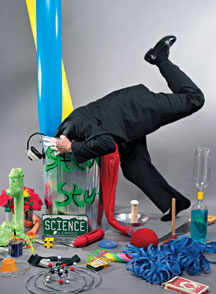 This activity, from the Steve Spangler Science website, is obviously designed for an elementary level science class. Students, in groups, use candy to create a facsimile of a neuron.
This activity, from the Steve Spangler Science website, is obviously designed for an elementary level science class. Students, in groups, use candy to create a facsimile of a neuron.I know that many high school psychology teachers do similar activities having students create neurons or brains from candy, clay, pasta, jello, paper, etc. If you do such an activity, please post it in the comments section or email it to me (Kent Korek - kkorek@germantown.k12.wi.us) and I will be happy to post it to this blog.
The activity's description can be found at http://www.stevespanglerscience.com/experiment/candy-neuron.
Brainsrule.com has a variation of the activity at http://www.brainsrule.com/pdf/neuron_cookie.pdf
Neuroscience for Kids shows a number of different materials at http://faculty.washington.edu/chudler/chmodel.html





3 comments:
I use Steve Spangler ideas in all of my classes, esp. my writing classes. His lessons can be adapted for all ages and across all curriculi, and I admire him tremendously. His energy and enthusiasm and humor and honest dedication have made him a mentor and ideal for many teachers.
I've always had students build model brains. They have great fun constructing them. At the end of the building days, students use their models for a one-on-one oral exam. As I hear from each student point out the structures on their models, the rest of the class is listing various brain functions on paper individually. Everyone's engaged, and, at the end of testing, we can eat the brains if made of edible stuff or display them in the Media Center. I'll e-mail Kent with the specifics of the assignment so that others may adapt it to their needs if they'd like. - Jennifer from Midland, Michigan
I've always had students build model brains. They have great fun constructing them. At the end of the building days, students use their models for a one-on-one oral exam. As I hear from each student point out the structures on their models, the rest of the class is listing various brain functions on paper individually. Everyone's engaged, and, at the end of testing, we can eat the brains if made of edible stuff or display them in the Media Center. I'll e-mail Kent with the specifics of the assignment so that others may adapt it to their needs if they'd like.
Post a Comment